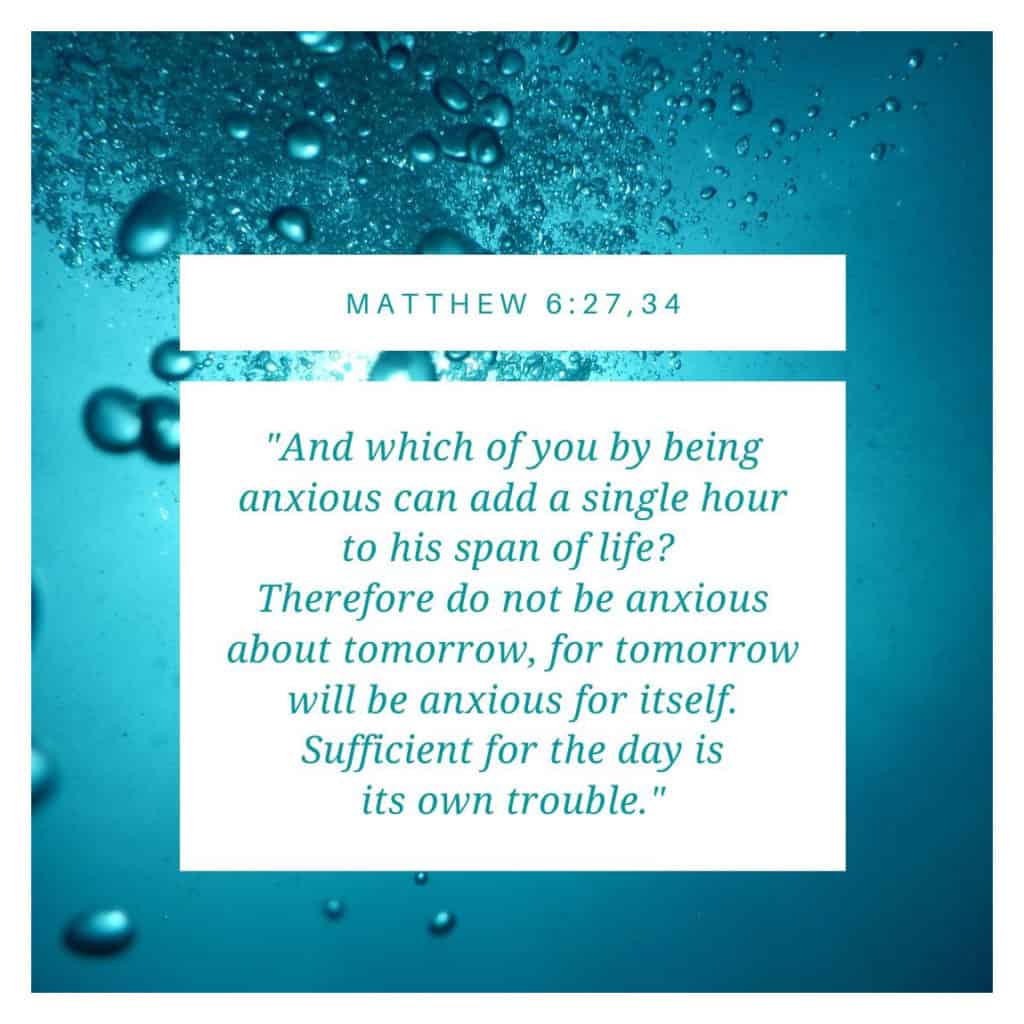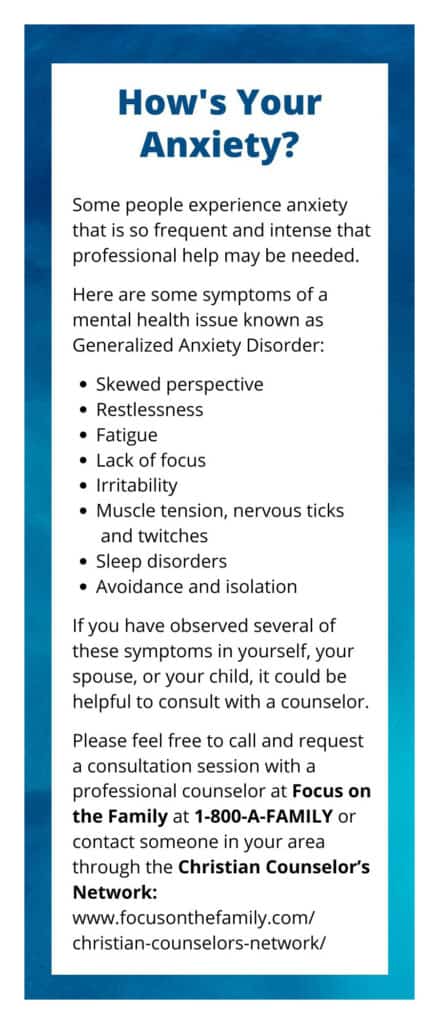
Chores Help Kids Be Successful In Life
Children build their self-confidence through learning small, real life skills.

Overcoming anxiety is something that we as parents must be intentional about. We must be purposeful in practicing how to focus on the present rather than uncertainty about the future.
In troubled times, such as what we are facing with this coronavirus outbreak, it is all too easy to worry. Uncertainties about the future can quickly spiral into anxiety and fear. The Bible tells us to “cast all your anxiety on Him because He cares for you” (1 Peter 5:7). How wonderful is it to know that God cares for us and the circumstances that we face? Even when we feel like things are spiraling out of control, God is absolutely in control. He knew before we were ever born that we would face worries. That’s why the Bible tells us, perhaps more than any other phrase, “Do not be afraid.”
As parents, it is critical that we train ourselves to manage our fears and anxiety in order to protect our children and train them to be resilient. Overcoming anxiety and caring for our family’s mental health all starts with us.
How, then, can we as parents keep our anxious thoughts in check? And how can we help our children who are anxious? Here is a look at what anxiety is and what we can do as parents to overcome it.
It’s very likely that you’ve experienced anxiety at some time in your life. Your heart pounded, your palms got sweaty, and you couldn’t catch your breath – all over a worry you once had. Some people only experience anxiety on occasion; for others, it’s an everyday occurrence.
Anxiety always comes in the form of a “what if” question. For example, you might ask yourself, “What if my health fails?” Or you may be thinking, “What if I lose my job and can’t make the mortgage payment? How will I feed my family?” Anxiety always focuses on the future and never on the present.
Think about this for a minute: Does the future exist yet? No. Now, how much control do you have over things that don’t exist? Zero.
This makes it easy to feel like things are completely out of control. Imagining all of the possible ways for events to unfold can be an endless road. Before you know it, the world is spinning and anxiety has you in its grips.
We can’t live in the future and we can’t control what happens there. However, we can plan for the future. The actions that you take today can make an impact on what happens tomorrow, next month, or next year. We certainly need to be wise with the choices we make and should make plans. But worrying about our futures does nothing to help us prepare for them. Jesus spoke about anxiety at length to his disciples by saying, “And which of you by being anxious can add a single hour to his span of life? … Therefore do not be anxious about tomorrow, for tomorrow will be anxious for itself. Sufficient for the day is its own trouble” (Matthew 6:27, 34).

Anxiety that continues for long periods of time can have detrimental effects on our minds and bodies. Our brains do not function well under constant levels of effort and stress. Anxiety causes our brains to use excessive amounts of serotonin, the neurotransmitter that contributes to our feelings of happiness and well-being. Constant anxiety can deplete our brain’s stores of serotonin. A shortage of serotonin can actually cause our brains to slip into depression and once that happens, it can be very difficult to reverse. It is critical for our wellbeing that we take steps to overcome anxiety. The good news? Anxiety has an antidote.
As previously mentioned, anxiety comes in the form of “what if” questions about the future. The best way to avoid anxiety is to keep your mind grounded in the present. However, this can be easier said than done. To overcome anxiety, you must be intentional and purposeful about training your mind to focus on the here and now. The good news is that we can learn not to worry.
Imagine you are taking your giant St. Bernard dog on a walk. The large dog is trotting along happily at your side as you enjoy the sunshine and scenery. Suddenly, a rabbit appears in the bushes and darts away in the opposite direction. Your dog will try to dive into the bushes to chase and catch the rabbit. If the dog isn’t trained, with as big as he is, you are going with him on that chase through the brush. If your dog is trained, however, you can pull on his leash and call him back, and he will return to your side. Then you can continue enjoying your walk.
The same goes for your mind. Every now and again, your thoughts are going to jump to the future and you’ll start asking those “what if” questions. It’s inevitable; it will happen. The difference will be whether you have trained your mind to come back to the present, or if you’re going to let it drag you down the bunny trail.
How do you train your mind? First, you can’t just read about how to overcome anxiety. You must put it into practice. The more you practice, the more resilient you will become and the more automatic the response will be when anxiety starts. Here are some practical ways to bring your mind back to the present:
We sat down with Tim Sanford, the clinical director at Focus on the Family, to discuss anxiety and ways to overcome it. He walked us through a technique that he calls “3 x 5 + 1.” It is a fantastic way to focus your attention on what is happening around you at that moment, rather than on the “what if” questions.
If you are feeling anxious, do these three steps:
Once you have gone through each of these 3 categories and listed 5 things each, ask yourself this 1 last question: “What do I need to be thinking about right now?”
This technique of observing your surroundings is a great way to pull your mind back into the present. Go ahead and try it right now!
If you feel yourself becoming anxious, another great way to bring your mind back into the present is to take several slow and deep breaths. Try taking three deep breaths right now. Notice how it calms and relaxes your body and tightens your focus on the present.
Due to the coronavirus, most of our schedules and routines have been completely disrupted. If at all possible, stick to a routine that is as similar as possible to your previous routine. If this is impossible, create a new schedule and stick to it. Sameness is very helpful in creating a sense of control in our lives.
Getting some exercise is also a great way to overcome anxiety. Choose activities that require focus on the moment at hand. For example, a game of basketball requires that you focus on the ball at all times and on making baskets. You don’t have time to worry about anything else.
Paul instructed us on how to overcome anxiety in his letter to the Philippians: “Do not be anxious about anything, but in everything, by prayer and supplication, with thanksgiving, let your requests be made known to God. And the peace of God, which surpasses all understanding, will guard your hearts and your minds in Christ Jesus. Finally, brothers, whatever is true, whatever is honorable, whatever is just, whatever is pure, whatever is lovely, whatever is commendable, if there is any excellence, if there is anything worthy of praise, think about these things” (Philippians 4:6-8).
Spend time daily in the Bible. If you are feeling anxious or fearful, read through the many verses that speak about anxiety and fear. Reading and studying His Word is a great way to focus your thoughts and will provide peace.
Spend time talking to God also. When we want to talk to someone about our worries and feelings, who better to share them with than the One who knows us best? There is nothing more freeing than getting on your knees before Him and surrendering all of your thoughts and worries to Him. He is truly in control of this and every other situation that we could ever face.

As parents, we must learn to manage our own anxiety before we can teach those skills to our kids. You cannot hide anxiety from your kids, even if you have Oscar-winning acting skills. Your kids will easily pick up on it, and can often become anxious themselves. Tim Sanford states, “Anxiety breeds anxiety.” Overcoming anxiety starts with us as parents to ensure that our kids maintain positive mental health during this coronavirus crisis.
Just like we as parents can experience anxiety, so can our kids. Younger kids may not know how to verbalize that they are feeling anxious, so keep an eye out for some signs that they may be feeling that way. Usually, anxiety will manifest in one of two ways: either your child will become really quiet and withdrawn or they will become really energetic and bounce off the walls. Kids may describe the physical symptoms of anxiety as a “tummy ache.” They may breathe rapidly or start sweating. Some kids will even say they feel like ants are crawling under their skin.
No matter how old your children are, or how they show that they may be anxious, it is always important to bring them back to the present. Just like our anxieties, kids worry about the future. Training them to focus their thoughts on the here and now can help calm their worries.
Here are some strategies – including the ones that you can use as a parent – to help your child overcome anxiety:
Kids always come up with great questions and, sometimes, they’re tough to answer. During the coronavirus outbreak, you can expect that your kids will ask questions such as “What will happen to us if we get sick? Will we die?” Or they may ask questions like, “What will happen to us if Mom or Dad loses their job?” It is important, no matter what questions the kids ask, to bring them back to the present moment.
You can respond to them by saying something like, “We are thinking about and planning for that right now. We don’t have answers yet, but we will let you know when we do.” You may choose to share a little more information with your older kids than you might with your younger ones, but be sure to keep the information consistent and focused on what you as a parent are doing right now to keep your family safe, supplied, and planning for the future.
The illusion is that the more knowledge we have, the more we are in control. Having knowledge does not change whether you can or cannot control a situation. Be aware of this when discussing tough circumstances like this coronavirus crisis with your kids and do not give into the temptation to tell them everything.
Overcoming anxiety is something that we as parents must be intentional about. We must be purposeful in practicing how to focus on the present rather than uncertainty about the future. Overcoming anxiety in our families starts with us as parents. We must manage our own anxiety and stay grounded in the present in order to help our children be resilient against it. It is especially important that during times of crisis such as we are currently experiencing that we learn to overcome that anxiety and put our trust in God.
Some people experience anxiety that is so frequent and intense that professional help may be needed. Here are some symptoms of a mental health issue known as Generalized Anxiety Disorder:
If you have observed several of these symptoms in yourself, your spouse, or your child, it could be helpful to consult with a counselor. Please feel free to call and request a consultation session with a professional counselor at Focus on the Family at 1-800-A-FAMILY or contact someone in your area through the Christian Counselor’s Network.
© 2020 by Focus on the Family. All rights reserved.